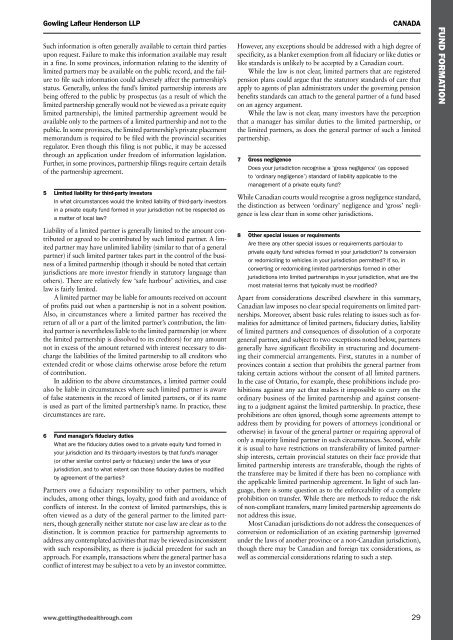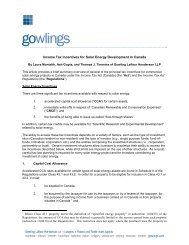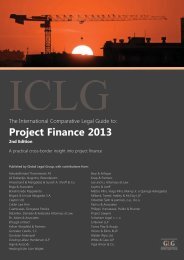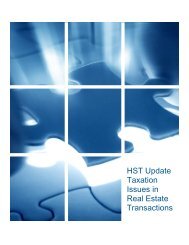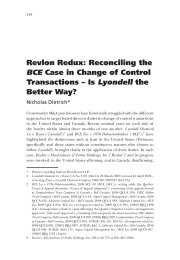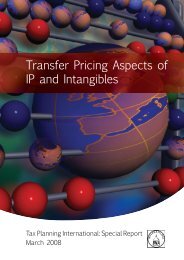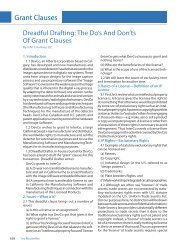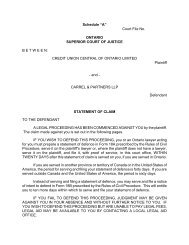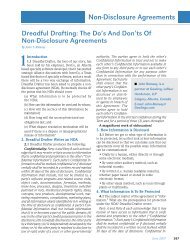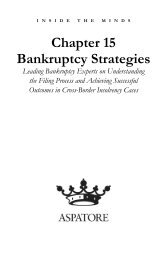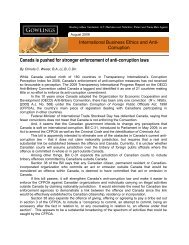Getting the Deal Through â Private Equity 2012 â Fund ... - Gowlings
Getting the Deal Through â Private Equity 2012 â Fund ... - Gowlings
Getting the Deal Through â Private Equity 2012 â Fund ... - Gowlings
- No tags were found...
You also want an ePaper? Increase the reach of your titles
YUMPU automatically turns print PDFs into web optimized ePapers that Google loves.
Gowling Lafleur Henderson LLPSuch information is often generally available to certain third partiesupon request. Failure to make this information available may resultin a fine. In some provinces, information relating to <strong>the</strong> identity oflimited partners may be available on <strong>the</strong> public record, and <strong>the</strong> failureto file such information could adversely affect <strong>the</strong> partnership’sstatus. Generally, unless <strong>the</strong> fund’s limited partnership interests arebeing offered to <strong>the</strong> public by prospectus (as a result of which <strong>the</strong>limited partnership generally would not be viewed as a private equitylimited partnership), <strong>the</strong> limited partnership agreement would beavailable only to <strong>the</strong> partners of a limited partnership and not to <strong>the</strong>public. In some provinces, <strong>the</strong> limited partnership’s private placementmemorandum is required to be filed with <strong>the</strong> provincial securitiesregulator. Even though this filing is not public, it may be accessedthrough an application under freedom of information legislation.Fur<strong>the</strong>r, in some provinces, partnership filings require certain detailsof <strong>the</strong> partnership agreement.5 Limited liability for third-party investorsIn what circumstances would <strong>the</strong> limited liability of third-party investorsin a private equity fund formed in your jurisdiction not be respected asa matter of local law?Liability of a limited partner is generally limited to <strong>the</strong> amount contributedor agreed to be contributed by such limited partner. A limitedpartner may have unlimited liability (similar to that of a generalpartner) if such limited partner takes part in <strong>the</strong> control of <strong>the</strong> businessof a limited partnership (though it should be noted that certainjurisdictions are more investor friendly in statutory language thano<strong>the</strong>rs). There are relatively few ‘safe harbour’ activities, and caselaw is fairly limited.A limited partner may be liable for amounts received on accountof profits paid out when a partnership is not in a solvent position.Also, in circumstances where a limited partner has received <strong>the</strong>return of all or a part of <strong>the</strong> limited partner’s contribution, <strong>the</strong> limitedpartner is never<strong>the</strong>less liable to <strong>the</strong> limited partnership (or where<strong>the</strong> limited partnership is dissolved to its creditors) for any amountnot in excess of <strong>the</strong> amount returned with interest necessary to discharge<strong>the</strong> liabilities of <strong>the</strong> limited partnership to all creditors whoextended credit or whose claims o<strong>the</strong>rwise arose before <strong>the</strong> returnof contribution.In addition to <strong>the</strong> above circumstances, a limited partner couldalso be liable in circumstances where such limited partner is awareof false statements in <strong>the</strong> record of limited partners, or if its nameis used as part of <strong>the</strong> limited partnership’s name. In practice, <strong>the</strong>secircumstances are rare.6 <strong>Fund</strong> manager’s fiduciary dutiesWhat are <strong>the</strong> fiduciary duties owed to a private equity fund formed inyour jurisdiction and its third-party investors by that fund’s manager(or o<strong>the</strong>r similar control party or fiduciary) under <strong>the</strong> laws of yourjurisdiction, and to what extent can those fiduciary duties be modifiedby agreement of <strong>the</strong> parties?Partners owe a fiduciary responsibility to o<strong>the</strong>r partners, whichincludes, among o<strong>the</strong>r things, loyalty, good faith and avoidance ofconflicts of interest. In <strong>the</strong> context of limited partnerships, this isoften viewed as a duty of <strong>the</strong> general partner to <strong>the</strong> limited partners,though generally nei<strong>the</strong>r statute nor case law are clear as to <strong>the</strong>distinction. It is common practice for partnership agreements toaddress any contemplated activities that may be viewed as inconsistentwith such responsibility, as <strong>the</strong>re is judicial precedent for such anapproach. For example, transactions where <strong>the</strong> general partner has aconflict of interest may be subject to a veto by an investor committee.CanadaHowever, any exceptions should be addressed with a high degree ofspecificity, as a blanket exemption from all fiduciary or like duties orlike standards is unlikely to be accepted by a Canadian court.While <strong>the</strong> law is not clear, limited partners that are registeredpension plans could argue that <strong>the</strong> statutory standards of care thatapply to agents of plan administrators under <strong>the</strong> governing pensionbenefits standards can attach to <strong>the</strong> general partner of a fund basedon an agency argument.While <strong>the</strong> law is not clear, many investors have <strong>the</strong> perceptionthat a manager has similar duties to <strong>the</strong> limited partnership, or<strong>the</strong> limited partners, as does <strong>the</strong> general partner of such a limitedpartnership.7 Gross negligenceDoes your jurisdiction recognise a ‘gross negligence’ (as opposedto ‘ordinary negligence’) standard of liability applicable to <strong>the</strong>management of a private equity fund?While Canadian courts would recognise a gross negligence standard,<strong>the</strong> distinction as between ‘ordinary’ negligence and ‘gross’ negligenceis less clear than in some o<strong>the</strong>r jurisdictions.8 O<strong>the</strong>r special issues or requirementsAre <strong>the</strong>re any o<strong>the</strong>r special issues or requirements particular toprivate equity fund vehicles formed in your jurisdiction? Is conversionor redomiciling to vehicles in your jurisdiction permitted? If so, inconverting or redomiciling limited partnerships formed in o<strong>the</strong>rjurisdictions into limited partnerships in your jurisdiction, what are <strong>the</strong>most material terms that typically must be modified?Apart from considerations described elsewhere in this summary,Canadian law imposes no clear special requirements on limited partnerships.Moreover, absent basic rules relating to issues such as formalitiesfor admittance of limited partners, fiduciary duties, liabilityof limited partners and consequences of dissolution of a corporategeneral partner, and subject to two exceptions noted below, partnersgenerally have significant flexibility in structuring and documenting<strong>the</strong>ir commercial arrangements. First, statutes in a number ofprovinces contain a section that prohibits <strong>the</strong> general partner fromtaking certain actions without <strong>the</strong> consent of all limited partners.In <strong>the</strong> case of Ontario, for example, <strong>the</strong>se prohibitions include prohibitionsagainst any act that makes it impossible to carry on <strong>the</strong>ordinary business of <strong>the</strong> limited partnership and against consentingto a judgment against <strong>the</strong> limited partnership. In practice, <strong>the</strong>seprohibitions are often ignored, though some agreements attempt toaddress <strong>the</strong>m by providing for powers of attorneys (conditional oro<strong>the</strong>rwise) in favour of <strong>the</strong> general partner or requiring approval ofonly a majority limited partner in such circumstances. Second, whileit is usual to have restrictions on transferability of limited partnershipinterests, certain provincial statutes on <strong>the</strong>ir face provide thatlimited partnership interests are transferable, though <strong>the</strong> rights of<strong>the</strong> transferee may be limited if <strong>the</strong>re has been no compliance with<strong>the</strong> applicable limited partnership agreement. In light of such language,<strong>the</strong>re is some question as to <strong>the</strong> enforceability of a completeprohibition on transfer. While <strong>the</strong>re are methods to reduce <strong>the</strong> riskof non-compliant transfers, many limited partnership agreements donot address this issue.Most Canadian jurisdictions do not address <strong>the</strong> consequences ofconversion or redomiciliation of an existing partnership (governedunder <strong>the</strong> laws of ano<strong>the</strong>r province or a non-Canadian jurisdiction),though <strong>the</strong>re may be Canadian and foreign tax considerations, aswell as commercial considerations relating to such a step.FUND FORMATIONwww.getting<strong>the</strong>dealthrough.com 29


